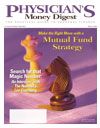Publication
Article
How to Protect Yourself from an Audit in 2006
It's the letter that no one wants to open. In 2006,the IRS plans on conducting about 1 millionaudits, up 37% from 2001. The agency says itwill target roughly 200,000 filers earning over$100,000—nearly double from 4 years ago.
Even if you aren't wealthy, self-employed individualsmay get caught in the government's expandingtax dragnet. Physicians in particular should be vigilantagainst the expensive and stressful possibilityof a tax audit. A qualified tax professional canassist you in the preparation of this year's return tominimize the chance of any questions from the IRS.
There are three types of audits. When the IRSsends a letter asking for clarification on relativelysimple items, this is called a correspondence audit.It's usually handled and completed through themail. The IRS conducts office audits on its turf:You meet with an examiner who wants to see documentationintended to answer their specific questions.It's wise not to volunteer any other informationbeyond what they ask. Field audits are thestuff of TV cop shows, and tend to be pretty serious.That's when the IRS comes to your home andstarts nosing around.
The government looks for particular signs andsignals that may put you in the audit pile. The IRSfocuses on the following key issues when decidingwho to target:
Bottom line:
•Goofing the basics. Remember to sign thereturn, include Social Security numbers, and double-check the math. Fill out every applicable line onthe return or, better yet, get a tax preparer to do itfor you, since professionally prepared returns tendto be easier to read and understand. Sloppy returns tend to draw scrutiny.
•Rounded numbers. It's always best to use theprecise number you need for an item rather thanrounding up or down. A rounded number tends todraw attention, even if it's a conservative amount.
•Sales of stocks or bonds. Anytime you sellstocks or bonds, the IRS receives a 1099 noting thesale price. Make sure you or your tax professionalaccounts for these sales on your return. Also rememberthat interest, dividends, and other sourcesof income are matched with the return from documentsthat are already on file with the IRS.
•High scores. Just like the lending industry, theIRS assigns you a score called the DiscriminateInformation Function (DIF). A computer programcompares the deductions you claim against othersin your income bracket. One of the best ways toavoid a high DIF score is to report all income, evenamounts you think are not worth mentioning.
•Itemized deductions. A good tax professionalcan advise you of reasonable deduction limits thatare less likely to trip your return. In particular, theIRS looks for overblown charitable deductions.Have a record for all cash contributions, and receiptsor other acknowledgment from the charity fordonations above $250. A word of caution for homeoffice deductions: Make sure you can substantiatethe area of your home that is used for business.
•Mileage. If you use your vehicle for work orbusiness, keep a notebook or chart in the car so youcan log your mileage. The records should list beginningand ending odometer figures, location, andreason for the trip. Keep the same meticulousrecords for mileage claimed for medical expensesand charitable purposes.
This article has been produced by the Financial Planning Association (www.fpanet.org), the membership organization for the financial planning community.
